
The STAR-K OTC Medicine List: Important Supplemental Information
Updated November 2024
►APPROVED OVER-THE-COUNTER MEDICATIONS is a USA-only list reviewed by STAR-K for year-round use. IT IS NOT A PASSOVER LIST.
►Products are approved only when sold in the United States and in the indicated form (e.g. caplets, children’s). For products sold outside the USA, contact the local kashrus agency.
►The list is a small sample of frequently used over-the-counter (OTC) medications. Prescription medications are generally not included.
►If a medication is not listed, it may still be kosher. One should consult a rav.
►Certifying agencies are indicated next to products that have kosher certification.
EXTREMELY IMPORTANT: It is imperative that each individual understands that under no circumstances should one refrain from taking a prescribed medication or withhold such a medication from children without discussing the matter with a competent rav and/or physician.
STAR-K Certified Companies
For a list of companies that produce kosher certified vitamins, nutritional supplements and over-the-counter products […]
![[Webinar] Children’s Medicine Shortage](/images/news_5_t.jpg)
[Webinar] Children’s Medicine Shortage
Rabbi Zvi Goldberg and Rabbi Dovid Heber discuss kashrus issues that have arisen as a result of the recent shortage of popular OTC and prescription medications, and what kosher consumers need to consider in dealing with the shortage. (Dec 28, 2022)
Listen here.
Direct Download available upon request.

Halachos of Taking Medicine on Pesach
Reviewed January 2025
For many years, Rav Gershon Bess prepared a Guide for Pesach Medications and Cosmetics which was published and distributed by Kollel Los Angeles. A partnership with STAR-K and the Kollel to make this information more widely available to the general public is still going strong after more than a quarter century. The Medications and Cosmetics Guide, available in Jewish bookstores nationwide, serves as an invaluable resource for kosher consumers seeking to purchase these items for Yom Tov.
Sefer Kovetz Halachos (Hilchos Pesach 12:4) states in the name of HaRav Shmuel Kamenetzky, shlit”a, that lechatchila one should take a medication approved for Pesach and mentions the availability and use of reliable Pesach lists and guides (see Hilchos Pesach, ibid., footnote 5).
The halachos pertaining to medication and cosmetic use on Pesach are based on the joint psak of Rabbi Moshe Heinemann, […]

The History of Passover Medicine Lists in Pre-War Germany
In the 1920s, the Jewish community in Germany numbered close to half a million people. They were made up mostly of professionals in finance and retail trade. German Jewry thrived within the general culture of the Weimar Republic. As an influx of approximately 70,000 East European Jews flocked to Germany to escape political oppression and violent anti-Semitism, Berlin soon became the center for Hebrew culture, reaching its peak between 1920 to 1924. It had become a safe haven for Hebrew and Yiddish speaking intellectuals, mostly Russian Hebrew writers. Although some Jews emigrated during this time, mostly to America or Palestine, many more did so after the rise of Nazism in 1933. Unfortunately, the majority of Jews remained in Germany, with catastrophic results.
During this inter-war period, many German Jews assimilated, thereby distinguishing themselves from their observant Eastern European brethren. However, there remained a strong element of […]

Medicine on Shabbos: Questions and Answers from Rav Moshe Heinemann
Kashrus Kurrents, Fall 2019
In the times of Chazal, people would grind up medicine as needed. Grinding is forbidden on Shabbos; therefore, Chazal enacted a gezeira that a person should not take medicine on Shabbos for a minor ailment. Even though it is not common nowadays for a consumer to crush his own medicine, the gezeira remains in full force. In general, it is forbidden for a person with a minor ailment to do anything on Shabbos which an observer would realize is being done for refuah. I asked Rav Heinemann, shlit”a, twenty questions regarding treating minor ailments on Shabbos. Below are the questions and his answers. Following that, I have added source material for those who wish to further understand these pesakim.
Q1: How bad does a headache or an allergy such as hay fever need to be in order to take medicine on Shabbos?
A person is generally not allowed to […]
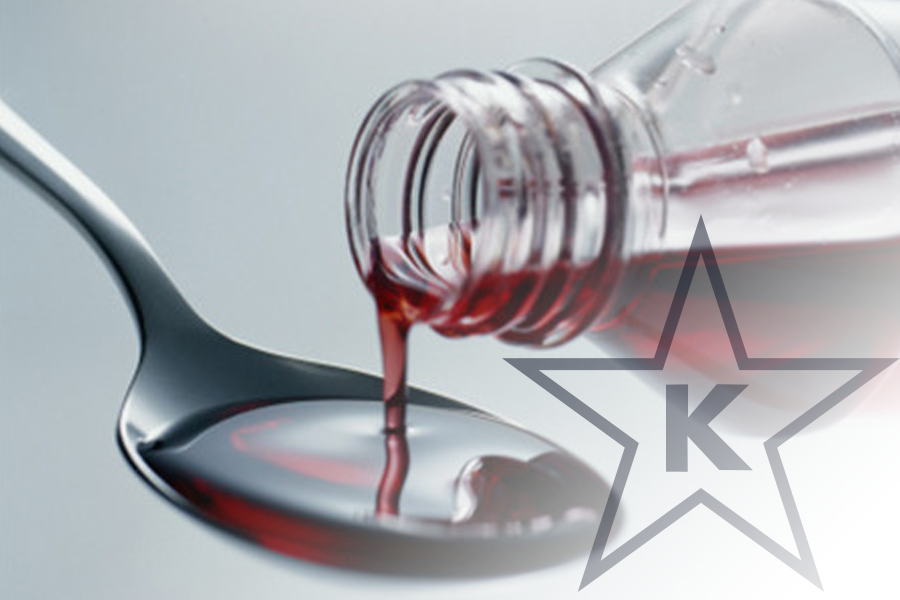
Just a Spoonful of Glycerin Makes the Medicine Go Down
In the world of food ingredients, there is no ingredient as versatile as glycerin. In the world of kosher ingredient sensitivity, there is no kosher-sensitive ingredient that compares to glycerin. Glycerin’s ingredient versatility is not limited to food grade applications. Glycerin is used extensively as a major component in the pharmaceutical and cosmetics industries, as well.
Glycerin is known as a humectant. That means that glycerin helps retain moisture. Therefore, glycerin is a perfect ingredient for the baking industry to keep bakery goods moist and give products a longer shelf-life. Glycerin is sweet and can be used as a substitute for liquid sugar. Glycerin is an excellent solvent and is used as a mainstay for food colors. These properties make glycerin an essential ingredient in a myriad of food applications.
Furthermore, glycerin’s natural properties make it an essential element in pharmaceutical products, as well as health and beauty aids. What is that […]

The STAR-K OTC Medicine List: Understanding How the List was Compiled
Ideally, one should purchase over-the-counter (OTC) products with a reliable hechsher. STAR-K certified products contain only kosher approved ingredients. A product containing a trace of a non-kosher ingredient (even if it is batel b’shishim) cannot be certified STAR-K. Similarly, all certified products are manufactured without any keilim concerns.
Unfortunately, very few OTC products are kosher certified, and kosher consumers who require such products are often confronted with shailos (questions).
STAR-K has reviewed ingredients used in hundreds of OTC products manufactured by many of the major pharmaceutical companies, including Bayer, Bristol-Myers Squibb, GlaxoSmithKline, McNeil, Novartis, Pfizer, Procter & Gamble, Purdue Pharma, Merck and Nestle.
In compiling a list of “approved” medications for use by one who is a choleh (ill) or has a maychush (discomfort), the following halachic guidelines were used:
Equipment
►If all ingredients are kosher, there is no concern that the medicinal ingredients were produced on treif equipment (see Yoreh Deah 122:6).
►If a non-kosher […]

Torah, Science & Kashrus in the Classroom
Spring 2025
Over the years, I have been invited on multiple occasions to speak at various girls’ high schools in Lakewood about the impact of astronomy on the Jewish calendar and halachic zmanim. The inherent message I have aimed to give over is that one needs a basic understanding of math and science to fully comprehend certain halachic issues.
For example, the earth’s rotation on its axis is the basis of zmanei hayom (halachic times of the day) that are so much a part of our lives with regard to davening times and knowing when Shabbos and Yom Tov begin and end. One needs to know how the moon rotates around the earth to better understand Rosh Chodesh and the Jewish calendar. Indeed, Chazal had keen insights into scientific topics that were discovered hundreds of years later by researchers.
Investigating how a product is manufactured and analyzing the composition of the raw materials […]

Eating Well on Pesach: Shiurim for Matzah and Wine for Healthy Individuals and Those With Diabetes or Other Medical Conditions
March 2025
The challenges of diabetes and other health conditions are magnified on Pesach. Aside from the numerous large meals that we have on any Yom Tov, Pesach adds a new set of concerns: the consumption of four cups of wine and set amounts of matzah during the Seder. Before discussing the challenges specific to the Seder, let’s begin by addressing eating during Pesach generally.
Eating Well on Pesach: Tips and Strategies
Enjoying our Yom Tov meals is an important aspect of how we celebrate Pesach. A health concern that may impact how you eat need not decrease your enjoyment of Pesach. There are many aspects of meals on Pesach that can be optimized to enhance your enjoyment.
► Designing the Menu
When planning your meals, consider the variety of foods. Having multiple foods on the table that are good for your health will allow your meals to feel plentiful. For some people, that means […]

Approved OB/GYN Medications & Products: Important Supplemental Information
Updated November 2024
►APPROVED OB/GYN MEDICATIONS & PRODUCTS is a USA-only list reviewed by STAR-K for year-round use. IT IS NOT A PASSOVER LIST.
►The list includes kosher approved products that are often prescribed by an OB/GYN.
►Products are approved only when sold in the United States in the indicated form (e.g., caplets, tablets).
►Premarin, Prempro and Prometrium, which are not kosher medications, are not included in the list. These are addressed in the STAR-K Kashrus Guide for the OB/GYN Patient article on this site.
►Company names are indicated for prescription drugs.
►The list indicates only the kosher status of a product. With respect to the use of any particular product due to other halachic issues, a rav should be consulted.
►Consult your physician before taking any medication.
Related Articles and Lists
STAR-K Kashrus Guide for the OB/GYN Patient
The STAR-K OTC Medicine List: Understanding How the List was Compiled

When It’s “Not Kosher” to Eat Kosher: The Halachos of the Fast Days
Fall 2023
With the impending arrival of Tzom Gedalya and Yom Kippur, now is a good time for a halachic review of the six ta’aneisim that are incorporated into the Jewish calendar.[1] In addition to the aforementioned, we fast on Asara B’Teves, Ta’anis Esther, Shiva Asar B’Tamuz and Tisha B’Av. The halachos apply to males from the age of thirteen and females from the age of twelve.[2]
Timing Is Everything: When the Fasts Begin and End
Yom Kippur[3] and Tisha B’Av[4] begin at sunset. If one wants to eat after the seudas hamafsekes, one should state before the end of the seudah that he wants to do so. Having this in mind before Birchas Hamazon is also enough.
The other fasts begin at alos hashachar (dawn).[5] On those days, if one wants to arise[6] before dawn and eat, he should go to […]

Feeding Your Pet: Barking Up the Right Tree
Reviewed January 2025
Download Pesach 2025 Pet Food List
To some people, the concept that there are restrictions regarding what can be fed to animals may seem amusing. They wonder, “Really now, must dogs also eat kosher?” Of course, animals don’t need to eat kosher food. However, Halacha clearly instructs people regarding what, how and when to feed them.
The Talmud Yerushalmi1 states that before acquiring an animal, one must be sure he will be able to properly provide for it. Certainly, the owner must also know the applicable halachos. The following is a discussion of some of these halachos, including the subjects of meat and milk mixtures, Pesach, buying and selling non-kosher pet food, feeding animals on Shabbos and Yom Tov, and feeding animals before you eat.
STAR-K is not necessarily recommending ownership of pets; rather, we are providing information for those owners who require it. We […]

The Kashrus, Shabbos, and Pesach Guide to Cosmetics
Updated January 2025
Ezra Hasofer established ten takanos (laws) covering a wide spectrum of Jewish life.1 The purpose of these takanos was to enhance Torah study, Shabbos, the Jewish communal court system, and the sanctity of the Jewish home and marriage. One of the takanos was that salesmen should travel from town to town to supply perfume and fragrances to the women of each community.2 It is clear that these items were important in Jewish life since ancient times.
The STAR-K hotline receives numerous inquiries relating to cosmetics and halacha. One must know the answers to questions regarding these products that are commonly used. Does lipstick require kosher certification? During Pesach, may one use perfume or makeup that contains chometz? Are any cosmetics permissible for use on Shabbos and Yom Tov?
Because these halachos are complex, it is important for consumers to have a clear grasp of the numerous issues and […]

The Kosher Conversation Episode 4: All About Medications
Medicine with Rabbi Dovid Heber
In this installment Rabbi Dovid Heber tells us all about medications. He answers many burning questions about kosher medication:
Is kosher medicine really necessary? What are the possible problems with medicine?Should you wrap your pills in paper before you take them? Should you wait until the pharmacy gets the kosher version?
All this and more!
Please email your comments and suggestions to [email protected]
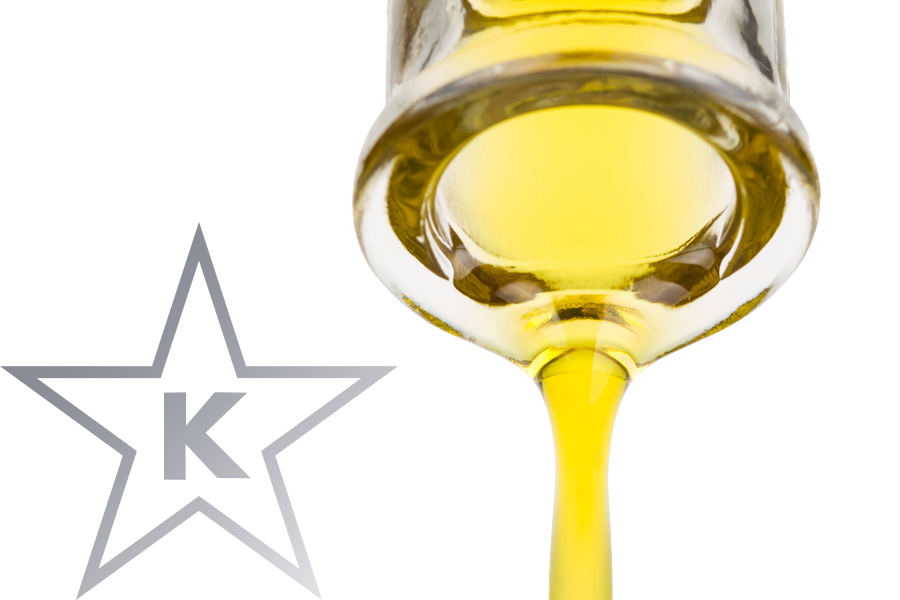
Insights from the Institute: Halachos Pertaining to Covid-19
Kashrus Kurrents, Summer 2020
2020 will be remembered for a long time to come as the year of the Covid-19 pandemic. These unusual circumstances have given rise to some unusual halachic questions. It is my fervent hope that everything will have returned to ‘normal’ by the time that you read this, and the lasting legacy will be the chiddushei Torah and piskei halachah that were generated as a result of this event. Below are some examples.
Q: If there are two adjacent houses with decks, with five men on one deck and another five men on the other deck, can they join together to form a minyan?
A: A gathering of ten men is needed in order for their davening to be considered tefilah b’tzibur. Once ten men have joined together to form a minyan, anyone else who is able to see them and participates is considered part of the minyan, and his […]

A 25 Year Retrospective on Kashrus Kurrents
Approximately twenty-five years ago shortly before “Pesach” 5738 Mr. A. J. Levin, a vice president of the Orthodox Jewish Council, began publishing Kashrus Kurrents. In that first issue, printed on the familiar yellow paper with the blue Kashrus Kurrents logo, it was deemed necessary to advise the Baltimore community that they cannot rely on labels or advertisements that merely states ‘Kosher for Passover’. From that same issue we learned that the fledgling Star-K organization had just inaugurated its kosher hot-line whereby one could get accurate kashrus information Monday through Thursday between the hours of 10 a.m. to 12 p.m.
A most welcome and popular feature was a list of items that did not require special Passover certification. Included were specific brands of sugar and cocoa as well as a number of commonly used over the counter medications. Compiling the list required substantial research by volunteers […]

STAR-K Hotline’s Most Popular Pesach Questions
Over 30 years ago, STAR-K Kosher Certification recognized a deep community need for a hotline. Today, the STAR-K Kosher Hotline answers close to 100,000 questions, annually, from consumers calling in from around the world. It is comprised of a team of seven highly-trained receptionists who answer the questions from a written script. All answers are pre-approved by one of the STAR-K Rabbonim, who are available to elaborate on certain questions. As the phones continue to ring off the hook since Shushan Purim, the hotline has received close to 6000 questions, in addition to the many hundreds we received via email and our app. These are the top ten questions that have been asked.
If my oven is self-clean, do I just turn it on to kasher it?
It’s not enough since the door and opposing face of the oven don’t usually get hot enough to clean. First clean those areas, then turn […]
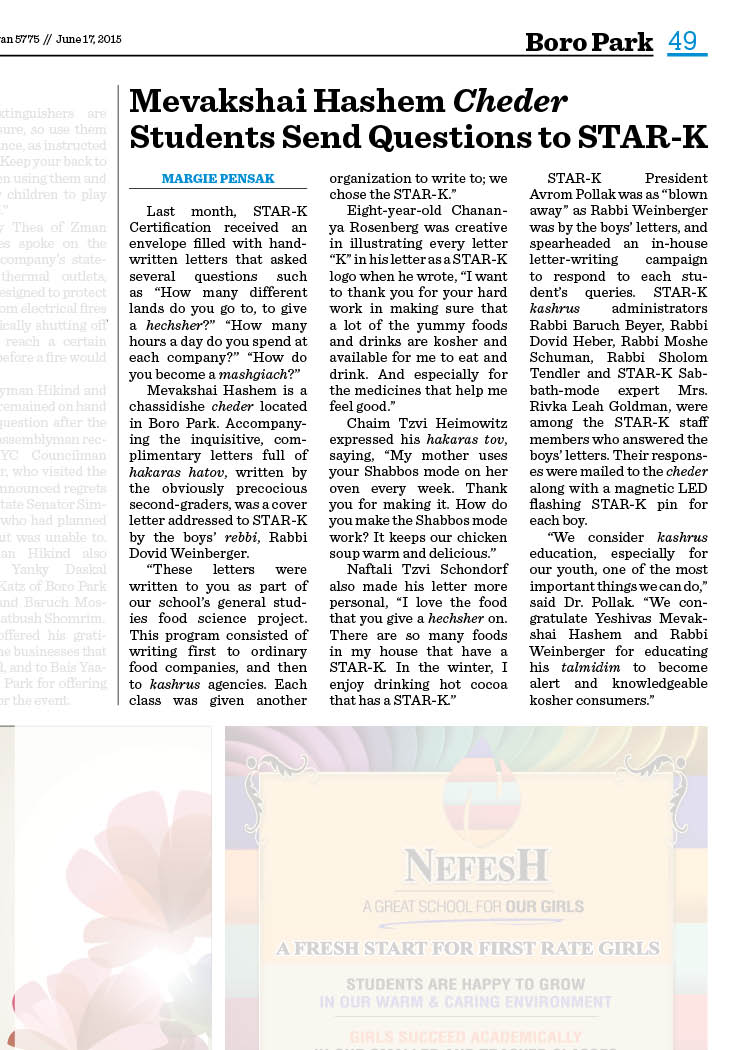
Mevakshai Hashem Cheder Students Get Their Kashrus Queries Answered by STAR-K Certification
http://baltimorejewishlife.com/news/news-detail.php?SECTION_ID=1&ARTICLE_ID=61182
Last month, STAR-K Certification received an envelope filled with handwritten letters that asked questions like: ‘How many different lands do you go to, to give a hechsher?’ ‘How many hours a day do you spend at each company?’ and ‘How do you become a mashgiach?’ Accompanying the inquisitive, complimentary letters full of hakaras hatov, written by the obviously precocious second graders of Mevakshai Hashem– a Chasidishe cheder located in Boro Park–was a cover letter addressed to STAR-K by the boys’ rebbe, Rabbi Dovid Weinberger:
“These letters were written to you as part of our school’s General Studies “food science project”. This program consisted of writing first to ordinary food companies, and then to kashrus agencies. Each class was given another organization to write to; we chose the STAR-K.”
Eight-year-old Chananya Rosenberg was creative in illustrating every letter “K” in his letter as a “STAR-K” logo when he wrote:
“I want […]

STAR-K Summer 5785/2025 Kashrus Training Seminars
BOTH THE FOODSERVICE MASHGIACH AND KASHRUS TRAINING CLASSES ARE NOW FULL.
APPLICATIONS FOR OUR WAITLIST ARE STILL BEING ACCEPTED.
12th Annual Foodservice Mashgiach Training Seminar
July 21-23, 2025 | כ”ה תמוז – כ”ז תמוז
Foodservice Mashgiach Training Application Form
22nd Annual Kashrus Training Program
July 28-31, 2025 | ג’ אב – ו’ אב
Kashrus Training Program Application Form
Both programs will be held at STAR-K’s Baltimore corporate headquarters.
Each program is limited to 25 attendees.
Kashrus Training Program
This widely acclaimed four-day program provides rabbonim, certifying agency administrators, kollel members, and others serving in klei kodesh, the opportunity to meet the personalities behind the internationally recognized and trusted STAR-K symbol. Attendees will be provided with a hands-on, practical application of the Shulchan Aruch, and learn how to structure a kashrus organization, along with the ins and outs […]

Getting Into the Thick of Things: GELATIN
Published Spring 2013
Have you ever had a slice of p’tcha galarita – that spicy, globby stuff Bubby used to cook up? How did she manage to make it so thick?
Better yet, open a can of gefilte fish. Look at the stiff jell that comes as its broth. Why is it that when you cook your own gefilte fish, you do not get that solid jelly from your broth? Did you ever wonder why theirs is so thick and yours is not?
COLLAGEN may be the answer to this thickening question.
Collagen is a fibrous, insoluble protein that makes up a major portion of bone, skin and connective tissue. By cooking animal bones or adding fish bones to the broth of your gefilte fish, you will extract some of the collagen from the bones. This gives you the wobbly jelly in p’tcha or in the gefilte fish that comes in a can.
The most common form in which collagen is marketed is partially hydrolyzed state known commonly as gelatin. […]

STAR-K Tevilas Keilim Chart
Kashrus Kurrents Summer 2015 | Updated March 2024
(ORIGINALLY PUBLISHED AS: A Practical Guide to Tevilas Keilim)
For a summary of the halachos involved, refer to Tevilas Keilim: Basic Guidelines.
UTENSIL
NEED FOR TEVILA – WITH OR WITHOUT A BRACHA
Aluminum Pan, Disposable
Tevila without a bracha if intended to be used only once; tevila with a bracha if intended to be used more than once.[1]
Aluminum Pan, Non-disposable
Tevila with a bracha[2]
Apple Corer (metal)
Tevila with a bracha
Baking/Cookie Sheet
Tevila with a bracha
Barbeque Grill
Racks require tevila with a bracha, other components do not require tevila.
Blech
No tevila
Blender/Mixer
Glass or metal bowl, metal blades and other attachments require tevila with a bracha, other components do not require tevila. Handheld immersion blender requires tevila with a bracha.
Bottle (metal or glass)
Tevila with a bracha. If bought filled with food and subsequently emptied by a Jew, does not require tevila.[3]
Brush (grill, egg yolk, pastry)
No tevila
Cake Plate (metal or glass)
Plate needs tevila with a bracha, cake plate cover does not require tevila.
Can (metal or glass)
Tevila with a bracha. If bought filled with food and subsequently emptied by […]

A 30 Year Retrospective on Kashrus Kurrents
Published Summer 2008
Approximately thirty years ago shortly before “Pesach” 5738 Mr. A. J. Levin, a vice president of the Orthodox Jewish Council, began publishing Kashrus Kurrents. In that first issue, printed on the familiar yellow paper with the blue Kashrus Kurrents logo, it was deemed necessary to advise the Baltimore community that they cannot rely on labels or advertisements that merely states ‘Kosher for Passover’. From that same issue we learned that the fledgling Star-K organization had just inaugurated its kosher hot-line whereby one could get accurate kashrus information Monday through Thursday between the hours of 10 a.m. to 12 p.m.

Star-K Side Bar Fall 2008
Other News From The STAR-K
STAR-K CERTIFICATION
TeleKosher Conference Program for Local Kashrus Agencies

The Secret Ingredient
Published Spring 2012
One of the trademarks of the Star-K is that it encourages its staff to respond to consumer kashrus inquiries. All too often, after eating a yummy treat, a consumer will notice a seemingly questionable item listed on the wrapper’s ingredient panel. They will then call the Star-K hotline in a frantic state because they fear they may have eaten something non-kosher, only to learn that they most likely mistook the ingredient for something else or that the ingredient has a kosher counterpart. The following is a list of commonly questioned ingredients that regularly appear on the labels of popular foods that we eat.

National Kashrus Lecture Series
Star-K’s National Kashrus Lecture Series features various topics delivered by Star-K administrators. Topics cover: Glatt Kosher Meat Today, Kosher Travel, The High Price of Kosher Foods, Caterers and Restaurants, Meat and Poultry, Kosher Liquors, Shabbos & Yom Tov Appliances, and the Kashrus of Medicines & Vitamins. Cassettes of these lectures are available through the Star-K office. For more information, click here or call Star-K,
(410) 484-4110.

She Sells Sea Shells: But Are They Kosher? The Kashrus Status of Glucosamine and Other Arthritis Remedies
Fall 2001
As the kosher consumer crosses Maryland’s spectacular Chesapeake Bay Bridge, it is hard to imagine that glucosamine, one of the most widely used arthritis remedies, is derived from the seafood shells found deep in the waters below. Sea shells are not the only surprising source of muscle and joint remedies. The levona (frankincense) used in the Beis Hamikdash, deer antlers, and an array of animals – including sharks and bees – also contain the raw materials of over-the-counter arthritis supplements.
STAR-K receives numerous inquiries regarding these products. This is no wonder, as over 40 million Americans suffer from some form of arthritis, and billions of dollars are spent each year on prescriptions and remedies. The following is an overview of how these products are manufactured and their kashrus status. Note: See disclaimer below.1
Glucosamine
The raw material for most glucosamine comes from crab, shrimp or lobster shells. Unlike oyster […]
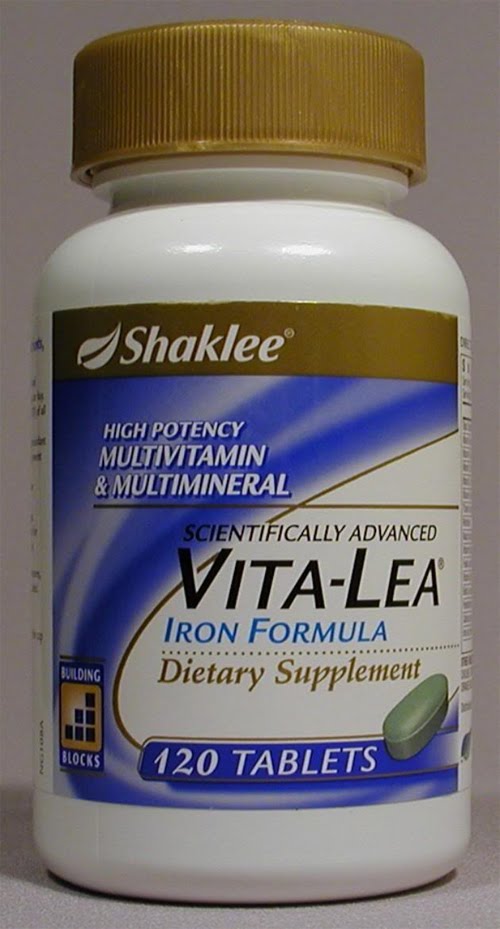
STAR-K Kashrus Guide for the OB/GYN Patient
Updated November 2024
When visiting an obstetrician/gynecologist, a patient may be given prescriptions or recommendations for an array of products by her physician. The patient may be confused about whether a particular product is kosher. The following guide was prepared to help clarify the kashrus issues regarding these products.[1]
Ideally, one should purchase medicinal products and vitamins with a reliable kosher certification. Unfortunately, this is not always possible. In the event a product is not kosher approved, one should consult her rav, as one does with any halachic question.
The following guidelines in this regard are the halachic ruling of Rav Moshe Heinemann shlit”a, STAR-K Rabbinic Administrator.
NOTE: The following are general halachic guidelines and cannot possibly cover all scenarios. Under no circumstances should an individual forgo taking a prescribed medication without first consulting her physician and rav.
CHOLEH SHEYEISH BO SAKANA: ONE WHO IS ILL AND WHOSE LIFE MAY BE IN DANGER
A choleh […]

A Kashrus Guide to Medications, Vitamins, and Nutritional Supplements
Click here to view the STAR-K Medicine List
Global sales of pharmaceutical products are expected to reach 500 billion dollars annually.1 It is therefore no wonder that the interest in kosher certification and approval for these products has also skyrocketed. Ideally, one should purchase these products with kosher certification. However, this is not always practical. It is for this reason that one of the most frequently asked questions on the Star-K hotline relates to the kosher status of these remedies. In an effort to clarify the numerous issues regarding these popular products, the Star-K has prepared the following halachic guidelines based on the psak of Rabbi Moshe Heinemann, shlita, Rabbinic Administrator of Star-K Kosher Certification.2
The Visitor’s Halachic Guide to Hospitals
Published Spring 2009
Updated Fall 2018
A person visiting a hospital patient is performing the great mitzvah of bikur cholim . It is one of the mitzvos for which a person reaps benefits in this world, while the principal reward is saved for the next world. While visiting the sick, some halachic issues may arise. This article addresses these issues from the visitor’s point of view. Questions affecting the patient (such as adjusting the bed, using the call button, and asking the staff to perform tasks on Shabbos ) are important issues that should be posed to one’s rabbi.
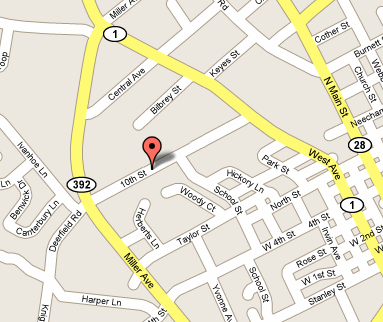
STAR-K Kosher Certification’s Diverse Kashrus Administrative Staff Takes Kashrus on the Road
The field of Kashrus is diverse and multi-faceted. These attributes are mirrored in the multi-talented, eclectic STAR-K Kosher Certification’s Kashrus Administrators, who recently took Kashrus on the road to audiences in Baltimore, Lakewood, North Miami Beach, and Oak Park, Michigan. Their topics spanned everything from Astronomy to Kosher Organic Certification.

 STAR-D
STAR-D STAR-S
STAR-S